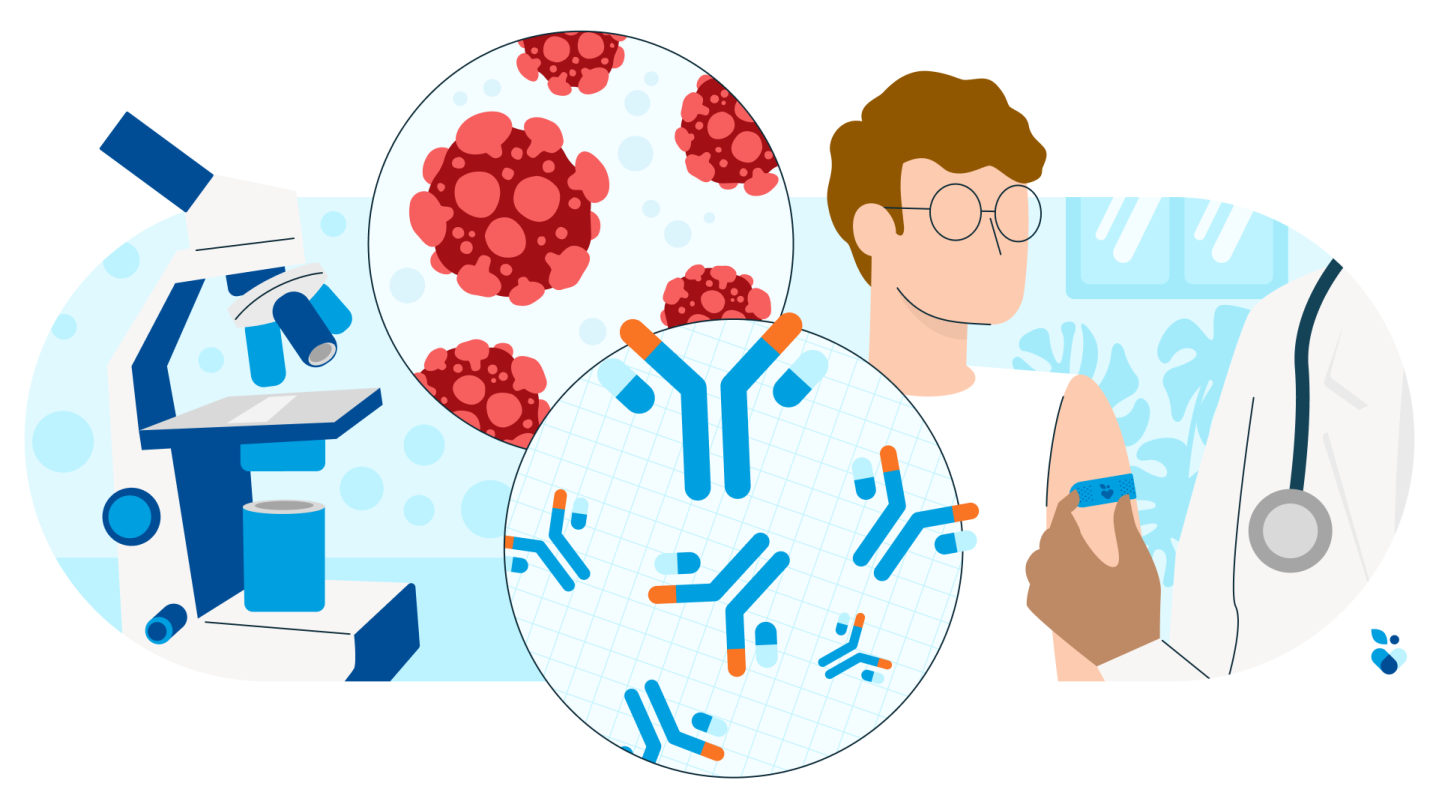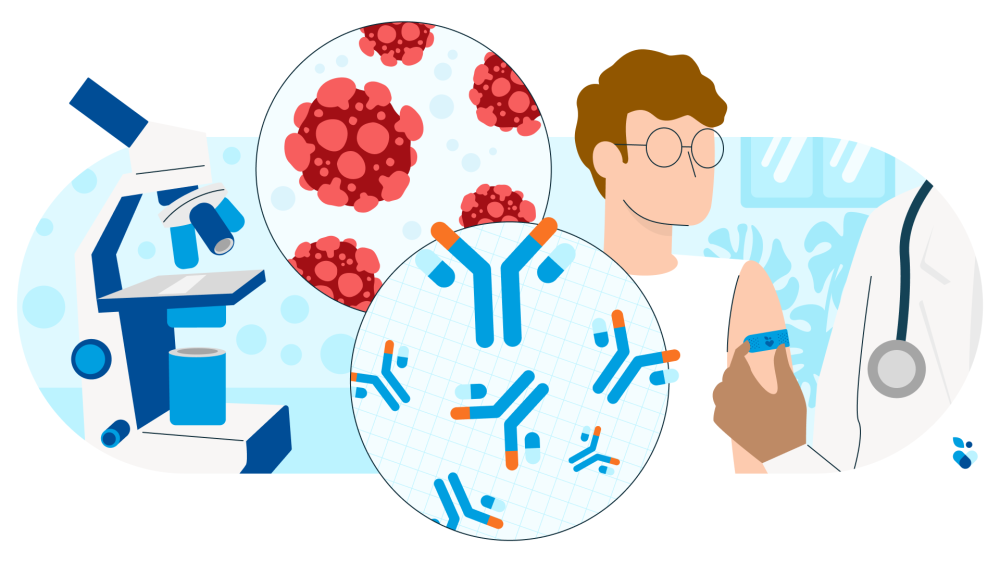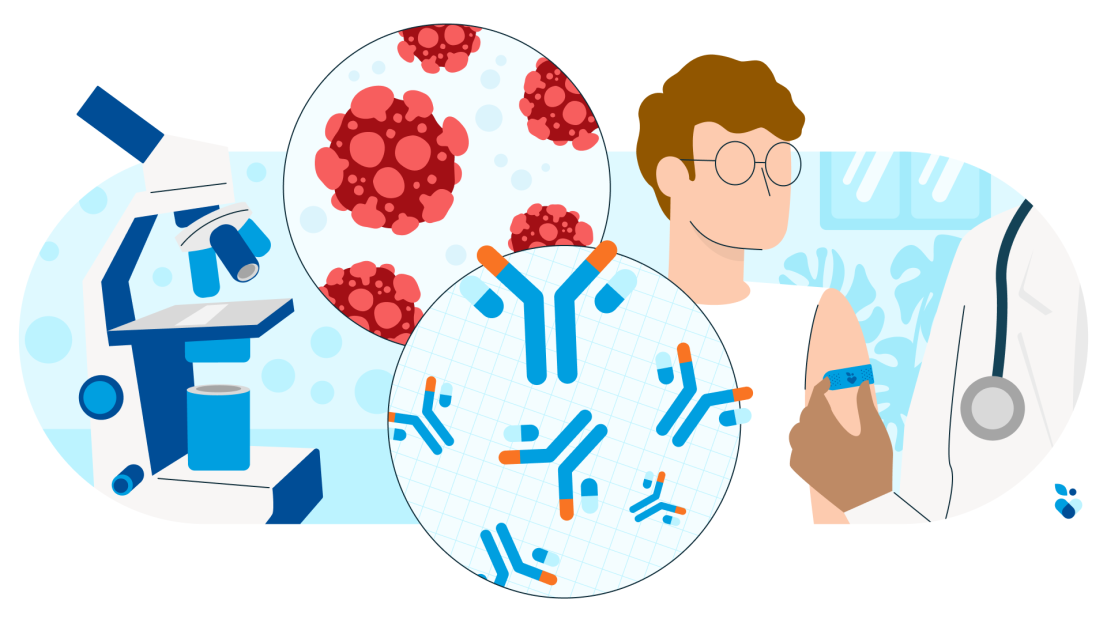Most of us have heard that getting a flu shot can help protect ourselves and those around us. However, you may naturally be concerned about flu vaccination’s potential side effects. This article will help dispel common misconceptions about flu vaccines, such as the belief that the flu shot can make you sick, and help you get the correct info on flu shot side effects.
If you’re unsure when to get your flu shot this season, find out on our blog. For several years, the Centers for Disease Control and Prevention (CDC) has used a mathematical model to estimate the beneficial outcomes of people getting the flu vaccines in the U.S.

The CDC expects the 2024-2025 flu season to have a similar or lower number of peak hospitalizations compared to the 2023-2024 season. the agency estimates that flu vaccinations prevented 6.0 million flu-related illnesses, 2.9 million medical visits, 65,000 hospitalizations, and nearly 3,700 deaths.1
Myth vs. Fact: Can the flu shot give you the flu?
MYTH. It’s a common misconception that the flu shot can give you the flu.
FACT: The flu vaccine cannot give you the flu, according to the CDC – the vaccine contains an inactivated virus (a virus incapable of causing infection) or a particle designed to look like a flu virus to your body’s immune system. Note that if we’re talking about the nasal spray flu vaccine (not the flu shot), the nasal spray does contain a live virus, but the viruses are changed, so they cannot give you the flu2.
Essentially, the purpose of the flu vaccine is to get your body to produce antibodies – according to the FDA3.
The influenza vaccine works by triggering your immune system to produce antibodies that help the body prevent the flu.
FDA
After scientists predict and select which flu virus strains will be prevalent in the upcoming flu season, manufacturers receive what’s called “candidate vaccine viruses” and make the flu vaccine in three ways4:
- Egg-based flu vaccine: After incubating in chicken eggs, the fluid containing the chosen candidate vaccine viruses is harvested from the eggs and then inactivated or killed. The virus antigen, or the substance that will cause your body to produce antibodies, is purified. For the nasal spray vaccine, the starting candidate vaccine viruses are used to make live but weakened viruses that are then used to produce the vaccine. The final vaccine cannot cause the flu.5
- Cell culture-based flu vaccine: Instead of incubating in chicken eggs, the chosen candidate vaccines replicate inside cultured mammalian cells (no animals are harmed). Then, the virus-containing fluid is harvested, the virus antigen purified, and then the process continues with purification, virus inactivation, and testing.4
- Recombinant flu vaccines: Recombinant flu vaccines don’t require using candidate vaccine viruses like the above two methods. Instead, they are created synthetically.4
As you can see from how the vaccine is made, any live viruses are inactivated or changed so they cannot produce infection.2
Myth vs. Fact: Can the flu shot cause side effects?
FACT. Like any medical product, vaccines can cause side effects, according to the CDC6.
The flu vaccine cannot give you the flu. What is true, however, is that there are common side effects of getting the flu shot, according to the CDC6:
- Soreness, redness, or swelling where you got the flu shot
- Headache
- Fever
- Nausea
- Muscle aches
- Fatigue
These side effects of the flu shot are generally mild and go away on their own in a few days, says the CDC.7 Note that the flu shot, like other injections, can occasionally cause fainting, according to the CDC.2
For the nasal spray vaccine, side effects include the following, according to the CDC8:
- Runny nose
- Nasal congestion
- Wheezing
- Headache
- Vomiting
- Muscle aches
- Sore throat
- Cough
If you experience these side effects, they usually start soon after vaccination and are mild and short-lived, according to the CDC.8
Overall, mild to moderate side effects of vaccines are normal and show that your body is learning how to respond to a flu virus if you encounter it, according to the National Lung, Heart, and Blood Institute.9 If you think you’re experiencing a severe allergic reaction or other emergency, call 9-1-1 and get to the nearest hospital or call your doctor.
Exploring rare risks and allergic reactions
Allergic reactions to flu shots are very rare, according to the CDC.6 Signs of serious allergic reactions include:
- Breathing problems
- Hoarseness or wheezing
- Hives
- Paleness
- Weakness
- A fast heartbeat
- Dizziness
If these reactions happen, it’s usually within a few minutes to a few hours after receiving the shot. These reactions can happen for people who are allergic to something in the vaccine, like egg protein or other ingredients.6 The CDC says that if you have a severe allergic reaction to a flu vaccine, call 9-1-1 and get to the nearest hospital.2
For no more than 1 or 2 cases per million people vaccinated, there is a small possibility that the flu vaccine could be associated with Guillan-Barre syndrome.6 However, this risk is much lower than getting severe complications from the flu, which can be prevented by the flu vaccine.
Though some studies have found this possible small association of flu shots with Guillain-Barre syndrome (GBS), other studies haven’t found any such association, according to the CDC. Rarely, GBS occurs after flu illness. Note that GBS hasn’t been associated with the nasal spray vaccine.2
Duration and severity of flu shot side effects
Some people report having mild side effects after getting the flu vaccine – including soreness, redness, tenderness, or swelling where the shot was given, says the CDC. The CDC also says that low-grade fever, headache, and muscle aches can happen – though if these flu shot side effects do occur, they start soon after vaccination and last 1-2 days.11
Most people don’t have serious side effects from vaccines, according to the U.S. Department of Health and Human Services (HHS). The most common side effects, e.g., soreness where the shot was given, are usually mild and go away quickly, says HHS. Experiencing the most common side effects is a sign that your body is beginning to build immunity, or protection, against a disease, according to HHS.10
Tips for relieving common side effects
The CDC has some advice for people who have possible side effects after getting a vaccine (in this case, a COVID-19 vaccine):13
- Talk to your doctor about taking over-the-counter pain relievers after the vaccine.
- If you can, get some rest.
- To help relieve pain or swelling on the arm where you got the shot, apply a clean, cool, wet washcloth on the area and remember to keep moving your arm.
- To help reduce fever discomfort, you can drink plenty of fluids and dress comfortably.
With any vaccine, the CDC says to look for anything unusual like a high fever, behavior changes, or signs of a severe allergic reaction (including difficulty breathing, hoarseness or wheezing, swelling around the eyes or lips, hives, paleness, weakness, a fast heartbeat or dizziness).
These allergic reactions are rare and would most likely happen within a few minutes to a few hours after the vaccination. If you think you’re experiencing a severe allergic reaction or other emergency, call 9-1-1 and get to the nearest hospital or call your doctor.2
Myth vs. Fact: Does the effectiveness of the flu shot vary?
FACT. Yes, vaccine effectiveness can vary, according to the CDC, which conducts studies every year to see how well flu shots protected against the flu.
However, recent studies show that getting a flu shot can reduce the risk of getting the flu by 40%-60% in the overall population during seasons when the flu vaccine is well-matched to what’s circulating.14
At least 2 factors play an important role in determining the likelihood that a flu shot will protect a person from flu:14
- Characteristics of the person who is getting vaccinated (like their age or health)
- How well the vaccines “match” the flu viruses that are spreading in the community
Note that there have been several studies that show that even if people who get vaccinated still get sick from the flu, the vaccine does reduce the severity of illness and flu-associated hospitalization, according to the CDC. Getting vaccinated may also help to protect those people around you, especially those who are more vulnerable to flu, like babies, young children, older people, and those with certain chronic health conditions.14
Myth vs. Fact: Does flu vaccination have long-term side effects, or will it weaken your immunity?
MYTH. Flu vaccination does not have long-term side effects, according to the CDC, and neither weakens your immunity nor makes you more susceptible to other viruses.11
Mild side effects begin soon after vaccination and last 1-2 days, according to the CDC, and very rare serious allergic reactions to flu vaccines happen within a few minutes to a few hours after vaccination.11
If you’re worried that getting a flu vaccine can make you more likely to get other respiratory viruses, rest assured that the majority of evidence shows this is not the case, including this 2013 study.11,14 There is also no evidence that a flu shot will increase your risk of getting sick from a coronavirus, like the one that causes COVID-19.11
In conclusion: Can the flu shot make you sick?
If you’ve received the flu shot or are planning to get vaccinated, know that the flu shot cannot give you the actual flu and does not contain a virus that causes infection, according to the CDC.2 Some people, however, do report mild side effects from the flu shot, like soreness where you got the flu shot, muscle aches, or low-grade headaches.6
Getting the flu shot can keep you from getting sick, according to the CDC – the flu vaccine prevents millions of illnesses and flu-related doctor’s visits. In addition, getting vaccinated may also help protect people around you, including those who may be more vulnerable to serious flu illness.16
-
1
1 | Centers for Disease Control and Prevention (CDC). 2021–2022 Estimated Flu Illnesses, Medical Visits, Hospitalizations, and Deaths Prevented by Flu Vaccination. https://www.cdc.gov/flu/about/burden-averted/2021-2022.htm
-
2
2 | Centers for Disease Control and Prevention (CDC). Flu Vaccine Safety Information. https://www.cdc.gov/flu/prevent/general.htm
-
3
3 | U.S. Food & Drug Administration. FDA's Critical Role in Ensuring Supply of Influenza Vaccine. https://www.fda.gov/consumers/consumer-updates/fdas-critical-role-ensuring-supply-influenza-vaccine
-
4
4 | Centers for Disease Control and Prevention (CDC). How Influenza (Flu) Vaccines Are Made. https://www.cdc.gov/flu/prevent/how-fluvaccine-made.htm
-
5
5 | NIH Library of Medicine. MedlinePlus. Antigen. https://medlineplus.gov/ency/article/002224.htm
-
6
6 | Centers for Disease Control and Prevention (CDC). Seasonal Flu Vaccines. https://www.cdc.gov/flu/prevent/flushot.htm
- 7
-
8
8 | Centers for Disease Control and Prevention (CDC). Live, Intranasal Influenza VIS. https://www.cdc.gov/vaccines/hcp/vis/vis-statements/flulive.html
-
9
9 | NIH National Heart, Lung, and Blood Institute. Vaccine side effects signal their effectiveness. https://www.nhlbi.nih.gov/news/2022/vaccine-side-effects-signal-their-effectiveness
-
10
10 | U.S. Department of Health and Human Services. Vaccine Side Effects. https://www.hhs.gov/immunization/basics/safety/side-effects/index.html
-
11
11 | Centers for Disease Control and Prevention (CDC). Misconceptions about Seasonal Flu and Flu Vaccines. https://www.cdc.gov/flu/prevent/misconceptions.htm
-
12
12 | European Journal of Heart Failure. Association of post-vaccination adverse reactions after influenza vaccine with mortality and cardiopulmonary outcomes in patients with high-risk cardiovascular disease: the INVESTED trial. https://onlinelibrary.wiley.com/doi/full/10.1002/ejhf.2716
-
13
13 | Centers for Disease Control and Prevention (CDC). Getting Your COVID-19 Vaccine. https://www.cdc.gov/coronavirus/2019-ncov/vaccines/expect.html
-
14
14 | Centers for Disease Control and Prevention (CDC). Vaccine Effectiveness: How Well Do Flu Vaccines Work? https://www.cdc.gov/flu/vaccines-work/vaccineeffect.htm
-
15
15 | Clinical Infectious Diseases. Influenza Vaccination Is Not Associated With Detection of Noninfluenza Respiratory Viruses in Seasonal Studies of Influenza Vaccine Effectiveness. https://academic.oup.com/cid/article/57/6/789/329048?login=false
-
16
16 | Centers for Disease Control and Prevention (CDC). What are the benefits of flu vaccination? https://www.cdc.gov/flu/prevent/vaccine-benefits.htm



















